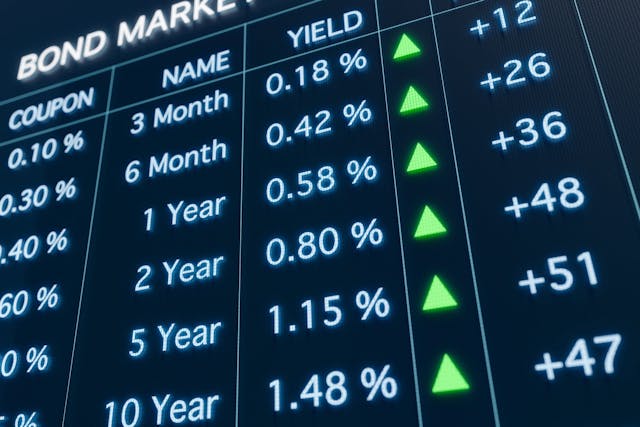Published on: 06/20/2023 • 5 min read
What Are Fixed Income Investments?

Fixed income investments can be a great option for those looking to diversify their portfolio, but if you find yourself wondering “What are fixed income investments?” don’t worry, you’re not alone.
Fixed income investments have the potential to provide investors with consistent cash flow and capital appreciation over time, but many investors struggle to understand exactly how these types of securities work, as well as the risks involved in investing in them.
In this article, we’ll discuss what fixed income investments are, how they work, and the pros and cons associated with them so that you can make an informed decision about whether or not they’re right for you, and if they can help you reach your financial goals.
What is fixed income investing?
Fixed income investments are a type of investment vehicle in which an investor lends money to an issuer, such as a company or government, in exchange for predetermined interest payments at regular intervals. Generally, the investor agrees to receive fixed payments over a specified period of time until the debt is fully repaid.
Unlike stocks, managed investment accounts, or mutual funds, which can generate returns through capital appreciation or dividends, fixed income investments provide investors with a potentially more predictable stream of income from interest payments. Furthermore, since the issuer is obligated to make these payments regardless of any economic downturns in the markets, these types of investments are generally considered to carry less risk than other types of securities.*
*Learn more about potential safe investments for retirement.
What type of investments are fixed income?
Common fixed income investment examples include:
- Bonds — A bond is an agreement between the investor and the issuer. In exchange for a fixed loan, the issuer agrees to make regular interest payments until maturity, at which point they must repay the loan in full. Common types of bonds include corporate bonds, municipal bonds, U.S. Treasury bonds, and mortgage-backed securities.
- Certificates of Deposit (CDs) — CDs are a type of time deposit offered by banks and other financial institutions. Investors agree to leave their money in the CD for a specified period of time, after which they receive their principal plus interest payments at predetermined intervals until maturity.
- Money Market Funds — Money market funds are a type of mutual fund that invests in various short-term debt instruments, such as Treasury bills and commercial paper. These investments typically offer higher yields than CDs but they can also be more volatile due to the underlying securities in the portfolio.
What are the pros and cons of fixed income investing?
Fixed income investments offer investors predictable income streams with lower levels of risk. However, it’s important to keep in mind that these investments can also have some drawbacks. Here are some of the benefits and risks to consider when evaluating fixed income securities.
Benefits of fixed income securities
The primary advantage of fixed income investments is that they offer investors a reliable source of investment income. As long as the issuer remains solvent and is able to pay back the loan according to the terms of the agreement, investors can receive a steady stream of interest payments, making this type of investing attractive for those who are looking for a more dependable cash flow.
Fixed income securities can provide a number of advantages for investors, including:
- Steady cash flow — Fixed income investments provide investors with predictable income streams from interest payments.
- Potentially lower taxes — Many fixed income investments are tax-advantaged, which can work to reduce an investor’s overall tax burden.
- Diversification benefits — Investing in fixed income securities can help diversify a portfolio and spread out risk among different asset classes. Other alternative asset vehicles to consider include buying art as an investment, real estate, or investing in other commodities.
Risks associated with fixed income
Despite their attractive income potential, fixed income investments can also carry a degree of risk. Some of the risks associated with fixed income investments include:
- Higher default risk — Default risk is the primary concern for investors in this asset class; since these investments are not backed by the full faith and credit of a government, there is always a chance that the issuer may default on its obligations.
- Low capital appreciation potential — Since these investments pay regular interest payments rather than dividends or stock price appreciation, they may not generate substantial returns over time.
- Inflation risk — Inflation can erode the value of fixed income investments over time, reducing their purchasing power and total returns.
Wondering if fixed income securities can complement your investment strategy? Let’s talk.
So, what are fixed income investments? They are a type of security that provides the investor with an agreed-upon fixed rate of return for a specified period of time. Overall, fixed income investing can provide investors with a lower-risk way to generate steady cash flow and diversify their portfolios.
However, it’s important to consider the potential risks and rewards before investing in these types of securities. If done properly and with the help of an experienced advisor, like those from Avidian Wealth Solutions, these investments can offer a powerful tool for building long-term wealth.
At Avidian Wealth Solutions, we understand the importance of building high-net-worth investing strategies that offer both stability and growth potential. To learn more about our investment planning services, schedule a conversation with us today.
More Helpful Articles by Avidian:
- Investing in Bullish vs. Bearish Markets
- Are Bonds Safe Investments?
- Debt Ceiling Concerns Surface as X-date Looms Near
- Protecting Elderly Parent’s Assets
- How to Talk to Your Advisor About Stock Allocation Strategies
Please read important disclosures here
Get Avidian's free market report in your inbox
Continue reading:

Schedule a conversation
Curious about where you stand today? Schedule a meeting with our team and put your portfolio to the test.*


